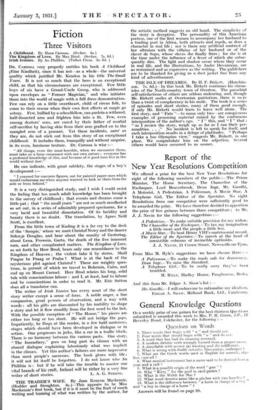Fiction
Three Visitors
A Childhood. By Hans Carossa. (Seeker. 6s.) Da. CAROSSA very properly entitles his book A Childhood (Eine Kindheit), since it has not—as a whole—the universal quality which justified Mr. Kendon in his title The Small Years. It is not so much that the hero is an exceptional child, as that his circumstances are exceptional. Few little boys of six have a Grand-Uncle Georg, who is addressed upon envelopes as " Former Magician," and who initiates them into the world of magic with a full dress demonstration. Few can rely on a little sweetheart, child of circus folk, to come to their rescue when their own first efforts at magic go astray. Few, bullied by a schoolfellow, can purloin a withered, half-dissected arm and frighten him into a fit. Few, even among doctors' sons, are cured by their father of morbid self-sacrifice by having skin from their arm grafted on to the mangled arm of a peasant. Yet these incidents, outré as they are, do not stick out from this story of an exceptional childhood. It includes them, tranquilly and without surprise, in its even, luminous texture. Dr. Carossa is wise :- " All things, oven the most horrible, when we encounter them, must take on a form consonant with our own nature ; everyone has a profound knowledge of this, and because of it good men live in the world without fear.
He can indicate, with great subtlety, the stages of a boy's development :- " I yearned for concrete figures, not for painted paper ones which would embarrass me when anyone wanted to look at them from the side or from behind."
It is a very distinguished study, and I wish I could resist the feeling that too much adult knowledge has been brought to the survey of childhood ; that events and dreams come a little pat ; that " the small years " are not so much recollected as set out, in a series of admirably prepared specimens, for a very lucid and beautiful dissertation. Of its lucidity and beauty there is no doubt. The translation, by Agnes Neill Scott, is excellent.
From the little town of Kading it is a far cry to the deck of the Serapis,' where we meet Christof Nowy and the dancer Solange Douglas, and hear about the enmity of Gestertag, about Lena, Frowein, Garta, the death of the five innocent men, and other complicated matters. The Kingdom of Love, as set forth by Herr Brod, bears only one resemblance to the Kingdom of Heaven ; the violent take it by storm. Shall Prague be Praag or Praha ? What is at the back of the mysterious plot against Christof ? These are weighty ques- tions, in pursuit of which we travel to Bohemia, Cairo, and end up on Mount Cannel. Herr Brod relates his long, solid tale with conscientious labour : and I, at least, had to labour and be conscientious in order to read it. Mr. Eric Sutton does all a translator can.
The Writer of Irish Ironies has every asset of the short story writer except a sense of form. A noble anger, a fine compassion, great powers of observation, and a way with words : all his gifts are discounted by his inability to shape a story and let it flow steadily from the first word to the last. With the possible exception of " The House," his pieces are either too long or too short. He will not bridge the gaps. Impatiently, he flings at the reader, in a few bald sentences, stages which should have been developed in dialogue or in action. One progresses in jerks, like a car in a traffic block. There is no harmony between the various parts. One story, " The Incendiary," goes on long past its climax with an absurd dialogue explaining laboriously what was implicit in the climax. Yet this author's failures are more impressive than most people's successes. The book glows with life : it will not let itself be forgotten. I do not know who An Philibin is : but if he will take the trouble to master one vital branch of his craft, Ireland will be richer by a very fine writer of short stories. L. A. G. STRONG.






































 Previous page
Previous page